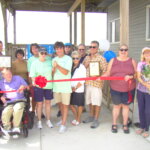CAPE MAY — City Council must make a decision as to the features a new Convention Hall should have such as solar panels, wind turbines and how much it wants to spend on auditorium seating, stage lighting and sound reinforcement.
Architect Martin Kimmel brought council a sort of “catalog” of options in the form of a PowerPoint presentation Thursday, Sept. 18. He presented projected costs of construction.
Demolition of the present hall is estimated at $150,000 with the cost of constructing a new convention hall at $9.2 million, said Kimmel.
Finishing the retail and restaurant areas of a new hall would be the responsibility of the tenants, freeing up $414,000, he said.
Kimmel estimated a contingency construction cost of 6 percent or $540,000.
Council has $984,000 left to spend on features of the building, he said.
Mayor Edward J. Mahaney said $984,000 “was not a tremendous amount of money,” and hard decisions needed to be made.
The new hall would be built to the “silver” standard of Leadership in Energy and Environmental Design (LEED) for energy conservation at no additional cost. The city’s Energy Committee has asked that a new facility be built “as green as possible.”
Kimmel said if the city wants the building certified to the LEED’s silver standard that would entail an additional $125,000 to $190,000 in inspection costs. Taking the building to the next level or “gold” would add an additional 5 to 10 percent, he said.
Installing solar panels would add $460,000 to $500,000 in costs and produce 16 to 35 percent of the buildings electric power needs.
Extra power could be sold to the power utility grid, he said. Not taking into account any state rebates for solar energy, the panels would pay for themselves in 18 years, said Kimmel.
Installing wind turbines, the vertical variety rather than ones with large propellers would add $60,000 in cost to the hall. The turbines would produce 3 to 5 percent of the building’s electricity needs, said Kimmel.
Council has three options for seating in the main hall.
Option one would be providing 1,200 chairs that would sit on the floor with no slope at a cost of $125,000 to $200,000, he said.
The chairs would need to be set up for each performance.
Seating option two would use risers that would pull out from the back wall adding an additional $135,000 in cost to the expense of purchasing 1,200 chairs, said Kimmel.
Seating option three would use risers with built-in seats for the rear section of the hall at a cost of $395,000 to $432,000. The hall would still require the purchase of about 600 chairs for the front section of the hall.
Kimmel said the chairs could also be used in community rooms on the second floor.
To allow the main hall to be divided in two, so simultaneous events could be held, a divider would cost about $100,000.
One option for stage lighting is a basic system equivalent to a high school auditorium for $20,000. Adding two, motorized trusses suspended from the ceiling, which hold lights and can be lowered to the floor, would cost $40,000 to $45,000. This would allow road shows to bring their own lights, said Kimmel.
A full theatrical lighting system with a light-sound control room would cost $25,000 to $45,000, he said.
A basic sound system suitable for voice but not for music would cost about $35,000 to $55,000.
For an audio-video system that would include an LCD projector and large screen, DVD player and recorder, professional grade, music quality sound system with additional speakers in the lobby and community rooms, computer inputs in the hall for the projection system, would cost $160,000 to $205,000 for a “very, very good sophisticated system.”
To the maximum level for a sound system including digital audio mixing with speakers suspended above the stage would add an additional $25,000 to $40,000, said Kimmel.
The option exists of building a wall of windows at the rear of the hall facing the beach that would open and fold up with an estimated cost of $98,000.
A blackout curtain for the wall of windows behind the stage would cost about $40,000, he said. A riser, telescoping 20 foot by 40-foot stage is priced at $25,000.
To equip three community meeting rooms with a projector, recessed screen and speakers would cost a grand total of $30,000 to $45,000, he said.
Costs to equip an outdoor stage on the beachside of a new hall would range from $38,000 to $46,000 for a rear projection screen and sound system, said Kimmel.
He said a security system with cameras, intrusion detection, card access locks and intercom would cost $35,000 to $50,000.
To equip the community kitchen, which is separate from the restaurant kitchen, costs would run about $75,000. Kimmel said the facility would be a “catering kitchen” which requires food to be brought in “already cooked.” The kitchen would have refrigeration and warming components.
To upgrade to a commercial kitchen, where cooking could take place, would add $75,000 to the cost, said Kimmel.
Additional items for consideration: administrative office furniture: $17,000 to $25,000, lobby furniture such as couches, chairs and plants: $15,000 to $20,000 and balcony lobby furniture: $21,000 to $25,000.
Tables for the main hall for events would range from $10,000 to $15,000 with storage carts.
Kimmel listed “now or never” items if not installed during construction of a new Convention Hall probably would not be included in the facility: LEED certification, hard surface outdoor decks instead of wood, structure for hall dividing partition, pre-wiring for lights and sound, commercial kitchen and roll up rear wall.
He said items that could be added later but not easily: solar panels, seating riser and partition to divide the hall.
Items that could easily be added later: wind turbines, landscaped crosswalk at the Promenade, stage lighting if building is pre-wired, upgraded sound system, projection equipment, security system, furniture and theatrical curtains.
“We are not recommending that you defer any of these, we are just telling you what is easy to add after the fact,” said Kimmel.
Deputy Mayor Linda Steenrod expressed concerns that a roll up wall facing the beach may allow birds to enter a new Convention Hall. She said it may be difficult to remove birds from the building.
The mayor said a public meeting would be held Oct. 9 to present the final version of the preliminary design.







